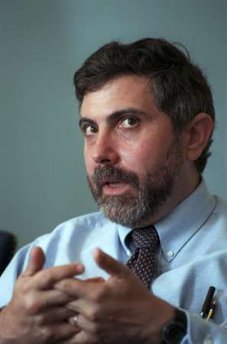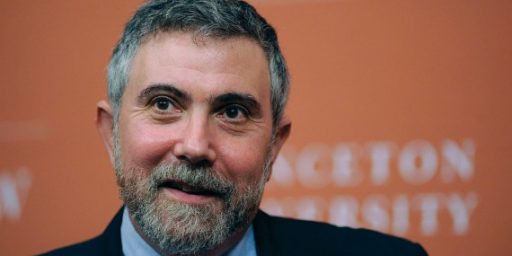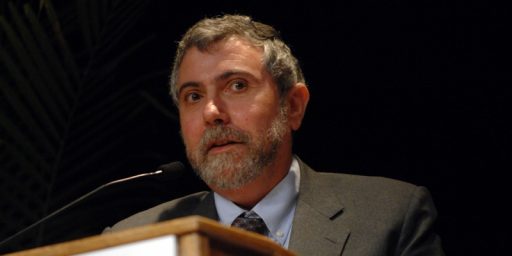DUELING ECONOMISTS
Dean Esmay contrasts Milton Friedman and Paul Krugman, both of whom were interviewed on prominent blogs yesterday. I essentially agree with his analysis, the core of which is:
I must admit, I’ve seen more economists criticize Krugman than Friedman, and Friedman has clearly been the more influential economist over the last half-century. That doesn’t mean anything, except I do generally think Friedman’s been vindicated on some very important things, while the jury’s still out on much of what I’ve seen Krugman claim.
Krugman also loses points with me for the bad partisan habit–getting worse all the time over on the left–to paint things he disagrees with as “lies.” It diminishes his credibility significantly.
While Krugman is best known for his NYT columns, he’s a brilliant economist, as evidenced by the fact he’s a recepient of the prestigious Clark Medal. He also has a massive publication list.
I read an earlier version of his The Age of Diminished Expectations as part of a graduate International Political Economy course a decade or so ago and thought it quite interesting at the time. Unfortunately, I fear he has fallen into the trap the snares many public intellectuals: he’s let the desire to be provocative overwhelm his scholarly precision. Indeed, he admits as much himself:
With any luck, you will find many of these pieces extremely annoying. My belief is that if an op-ed or column does not greatly upset a substantial number of people, the author has wasted the space. This is particularly true in economics, where many people have strong views and rather fewer have taken the trouble to think those views through – so that simply insisting on being clear-headed about an issue is usually enough to enrage many if not most of your readers.
Update (1455): I meant to post this earlier but got distracted by actual work. This essay by Krugman on his professional philosophy is quite illuminating.






‘There’s a confusion between objectivity and even-handedness, they are not the same thing,” Krugman said. “If Bush said the earth was flat, the reports in the mainstream media would say, ‘Shape of the Earth: Views Differ.”‘.
Kind of says it all.
Dean Esmay’s analysis, like his how-to-find-love on the internet or his caveman diet, leaves much to be desired.
Obviously, Esmay hasn’t done his homework if he believes Friedman’s work hasn’t been found wanting, particularly as Friedman aged and he began a flirtation with libertarianism that most of his fellow economists view with sadness and pity. In fact, many are willing to overlook Friedman’s Hayek infatuation as the result of advanced age/incapacitation.
Certainly Friedman’s semi-endorsement of supply side economics has to be considered a failure. And who could possibly think Friedman’s use of the Chicago School model in Chile as anything but an abysmal failure?
Having said that, there’s little question Friedman was a giant in the field of economics. To compare and contrast Krugman with Friedman is high praise indeed. It’s like comparing Barry Bonds with Willie Mays–the guy who finishes in second place is pretty damn good.
—